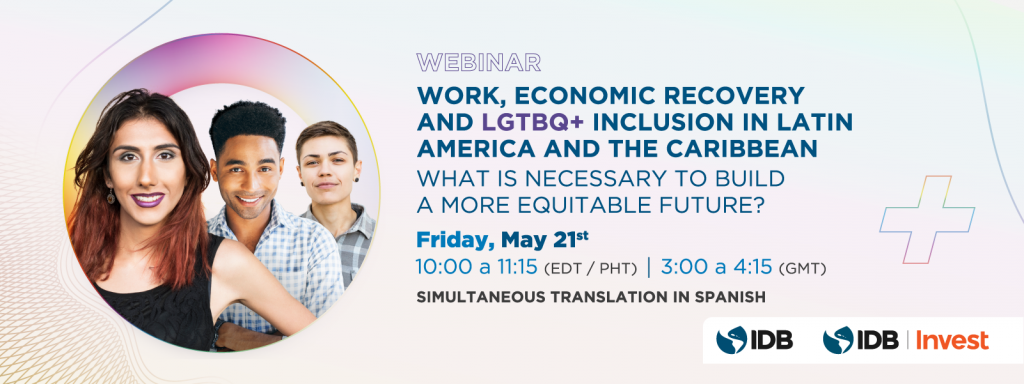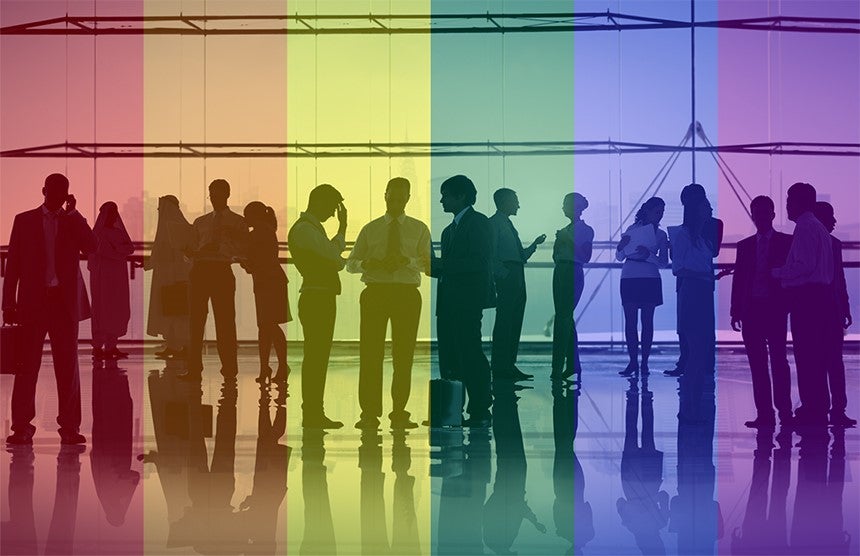The COVID-19 pandemic has caused more job and income loss across the globe than any of us have seen in our lifetime. Data collected by the IDB’s COVID-19 Labor Observatory indicate that more than 30 million jobs have been lost in Latin America and the Caribbean.
And while the effects of the pandemic for specific population groups have still not been fully documented, we are gradually uncovering the inextricable link between crisis impact, gender, and diversity. For the LGBTQ+ community, publicly available data still remains sparse in the region, although there are a few research initiatives currently underway that should bear fruit this year. Until more data is available, we can look to what we already know about pre-pandemic inequalities and challenges to guide our efforts toward inclusive economic recovery:
- LGBTQ+ people are less likely to be invited for a job interview after disclosing their sexual orientation or gender identity (SOGI). Research in the US found that callback rates for heterosexual, cisgender applicants were 40% higher than callbacks for equally qualified LGB applicants (11.5% and 7.2%, respectively).
- They tend to earn less. In Mexico, LGBTQ+ people reported earnings lower than their equally educated heterosexual and cisgender counterparts, with transgender women reporting the lowest income levels.
- LGBTQ+ people face discrimination and violence in the workplace. In Costa Rica, 34.5% of LGBT workers reported experiencing discrimination; in Peru, 11.5% experienced discrimination or violence; and in Ecuador, 22% experienced violence.
- Transgender people are often pushed into sex work due to barriers they face in the formal sector. A study in Uruguay revealed that 67% of transgender people had worked or still worked in the sex industry. In Mexico, transgender women and men were found to have the highest levels of sex work among all groups surveyed (25% and 8.9%, respectively, compared to less than 1% of cisgender participants).
- . LGBTQ+ people in the United States, for example, are more likely to work in the informal sector and in the service sectors (food services, hospitals, education, and retail), where adverse economic effects of COVID-19 have been felt the most.
What can we do?
Fortunately, some policy and programmatic responses to LGBTQ+ economic exclusion have emerged in several countries in Latinamerica and the Caribbean. While still quite modest, they offer a valuable point of departure.
- Targeting LGBTQ+ people in programs for labor intermediation and skills development. Early in the COVID-19confinement period, the government of Argentina had already incorporated 3,536 trans people into the programa Potenciar Trabajo (Enhance Work Program), which offers courses to facilitate primary and secondary education completion, vocational training and certification, and subsidies and credit to start productive initiatives.
- Working with the private sector to increase LGBTQ+ employment. Innovative partnerships between LGBTQ+ civil society organizations and the private sector are advancing in several countries of the region to foment inclusive workplaces and the hiring of LGBTQ+ talent. In Mexico, Chile, and Peru, many businesses have undergone evaluations with NGO partners to benchmark their LGBTQ+ policies against competitors and be listed publicly as an inclusive workplace. Additionally, the LGBT Chambers of Commerce in Mexico and the Dominican Republic have numerous programs with the private sector, including a way to connect talented LGBTQ+ people to prospective work opportunities.
- Including LGBTQ+ workers in income transfer programs. Most government programs still do not explicitly include LGBTQ+ people, who are often overrepresented in the informal economy, to improve their coverage in cash transfers programs, pension programs, and unemployment insurance programs. One positive exception is the Tarjeta Uruguay Social (Uruguay Social Card, TUS), which provides the trans community prepaid cards to buy food and basic necessities from 2500 commercial establishments. In 2020, the program temporarily increased the amount of money transferred to trans beneficiaries and provided them with an emergency food basket that could be redeemed using cell phones.
- Strengthening LGBTQ+-led civil society organizations that provide needed food, financial services, and overall support to the community, and address gaps not addressed by the public sector. This support is particularly important for the hardest hit LGBTQ+ people who are poor or work in the informal sector and are often excluded from social safety nets and public health programs. The Eastern Caribbean Alliance for Diversity and Equality (ECADE) and the United Caribbean Trans Network (UCTRANS) are two regional organizations that have provided emergency services as well as financial support during the COVID-19 crisis.
As we commemorate the International Day against Homophobia, Transphobia and Biphobia (IDAHOTB), we must acknowledge that access to jobs, financial support, and safe, inclusive work environments are among the most urgent needs facing the LGBTQ+ community in the region. The economic recovery plans being designed and implemented across Latin America and the Caribbean provide unique opportunities for promoting inclusive economic development. That is, if we can help move LGBTQ+ people, along with other diverse populations, from the periphery to the center of the region’s policy agenda.



Leave a Reply